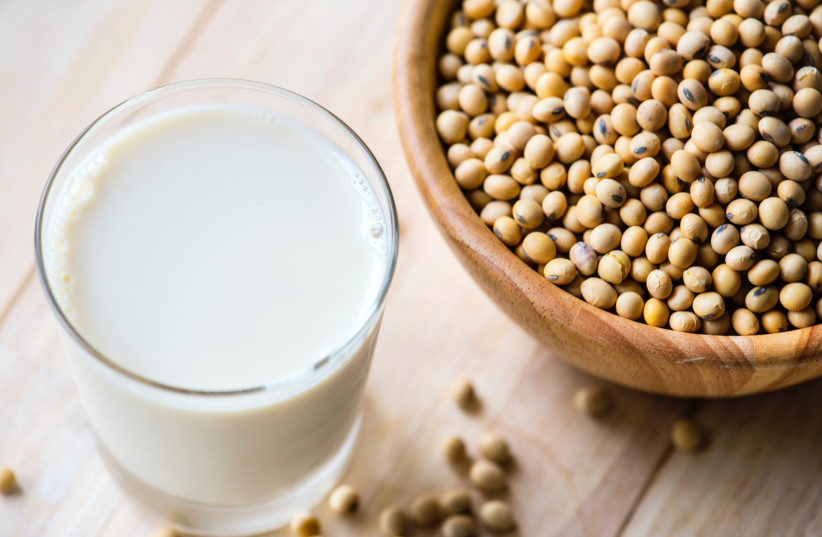The Israeli market is saturated with imported and local milk substitutes, ranging from soy milk, almond milk, rice milk, coconut milk, oat milk and even hazelnut milk.
Sometimes, creative recipes for plant-based milk show up online, such as a poppy-based milk alternative that says it's the healthiest one out there.
In general, it's very important to not believe every health trend you see on the Internet – unless it comes from a professional and qualified source.
But before we dive into the healthiness of milk substitutes, we should clarify an important point. These milk alternatives are marketed as rice milk, almond milk and so on. However, apart from taste and color, there isn't any connection between them and milk. If we were to be accurate, they would be called rice drink and almond drink, and so on.
Which is the best milk alternative?
When it comes to choosing a plant-based alternative, we need to compare its nutritional value with actual milk, which is produced by mammals to feed their babies.

"Real" milk (from a cow or goat) is rich with a variety of nutrients like protein, calcium, vitamin A, vitamin D and more.
Out of all the milk substitutes, the one most similar to cow's milk is soy milk, with similar levels of protein, fat and carbohydrate. Some soy milk is even enriched with vitamin D and/or vitamin B12.
In terms of protein, fat, carbohydrate and water levels, no other plant-based alternative comes closer to cow milk than soy milk.
One 200 ml glass of enriched soy milk contains 7-8 grams of protein, 4-5 grams of fat and other nutrients that come from the soy itself – not to mention any vitamins it was enriched with.
However, many people still avoid soy milk in favor of other plant-based milk alternatives due to concerns about soy consumption. Regarding this, the Israeli Health Ministry's most recent report on the subject (published in 2016) refutes all these concerns, stating that soy is perfectly healthy for daily use.
But what about other milk substitutes?
But maybe you prefer other milk alternatives. If so, how do you go about making those milk alternatives more nutritious?
You can actually prepare it at home and increase the concentration of healthy nutrients compared to water, therefore making it more nutritious.
When using plant-based milk alternatives of any type, it's important to shake them well before use.
For example, say you add plant-based milk to make coffee. It can cause components to break down into "flakes," which can ruin the coffee's texture and make it far less appealing.
In addition, milk substitutes aren't suitable alternatives to baby formula and are not suitable for providing infants and children with the necessary nutrients. Babies should be sure to use a formula designed for their age, regardless of whether it is dairy or plant-based. And because these milk alternatives all contain poorer nutritional values, children shouldn't have them either. It's like eating cornflakes with water and sugar.
If you need to serve children with a plant-based alternative, only enriched soy milk can do the job – but that still isn't suitable for infants.
How can you make your own plant-based milk alternative?
In order to make plant-based milk substitutes, the raw material is soaked and ground with a lot of water – sometimes cooked depending on the recipe. It then goes through a filtering process to get rid of anything solid still there.
Industrial processes have other steps to make the milk suitable for refrigeration and storage. For example, shelf-stable milk (or long-life milk) are sterilized (ultra-pasteurized) and doesn't need preservation by being boiled at high temperatures and then being sealed in a container.
Here's how to make your own soy milk at home:
Ingredients:
- 1 cup of dry soybeans (available at your local health food store)
- Water
- Vanilla extract
Instructions:
- Soak the soybeans in a lot of water for at least 12 hours.
- Drain the soaked beans and then transfer them into a pot filled with water. Cover them.
- Cook for three hours until the soybeans have softened.
- Strain the soybeans from the water and put them in a blender with four cups of water.
- Grind the soybeans well and add some sweeteners, salt, vanilla extract, etc according to your personal taste.
- Transfer the liquid into a strainer lined with cheesecloth and squeeze the cloth into the bowl. That liquid you squeeze out is your soymilk.
- Don't throw away the residue left in the filter. This is called okara and you can use it to make fritters, meatballs and more.
Additional notes:
- Add half a teaspoon of baking soda to the cooking water to speed up the softening process.
- Using a pressure cooker can significantly shorten your cooking time.
Storage:
- Can be stored for up to three days in the refrigerator and can also be stored in the freezer.
